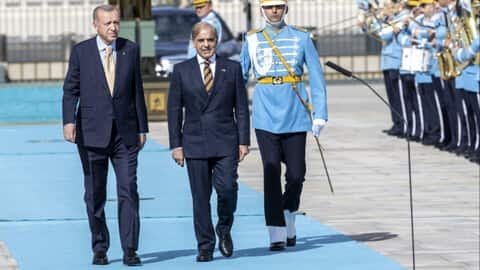Did India do right or wrong by sending help to Turkey?


Highlights –
Turkey once again showed its colors, when it forgot the favors done by India in just a month and supported Pakistan in the United Nations Human Rights Council. It tried to justify Pakistani propaganda against India by playing Muslim brotherhood card. Joining the ranks of Pakistan, it accused India of violating human rights in Jammu and Kashmir.
Earlier, Pakistan had also made similar allegations. However, India has given a befitting reply to Pakistan. Seema Pujani, India’s representative at the UNHRC, had said, “Pakistan’s representative has once again misused this prestigious platform for his malicious propaganda against India.” She also said, “Pakistan’s talk on human rights is a joke. Those who raise their voice disappear in Pakistan.” India has slammed Pakistan for its “propaganda”, saying it has a “unique characteristic” of harboring the largest number of terrorists declared by the UN Security Council and its policies have led to the death of thousands of people around the world. are directly responsible for. The surprising thing is that Turkey also spewed venom against India in the UN, joining Pakistan’s voice. This is the same Turkey which is speaking against India which is emerging from the devastation of earthquake with the help of India. During this, India stopped speaking to both Turkey and Pakistan. In Geneva, exercising its right of reply to Pakistan’s statement at the UNHRC on Friday, India said that when Pakistan is not completely oppressing its own people, it is playing its part in harboring and abetting international terrorists. Pours out all the energy.
Seema Pujani, Secretary, Permanent Mission of India to the United Nations, said, “Pakistan has the unique distinction of hosting the largest number of terrorists and terrorist organizations declared by the UNSC. Osama bin Laden was hiding in a compound located just opposite Pakistan’s top military academy. Its security agencies aided and sheltered Hafiz Saeed and Masood Azhar for decades. In response to Pakistan’s statement, he said, ‘These are just some unfortunate examples of Pakistan’s history of supporting terrorism. Pakistan’s policies are directly responsible for the deaths of thousands of people across the globe.
Highlighting the atrocities on minorities in neighboring Pakistan, Seema Pujani had said, “There is no religious freedom for minorities in Pakistan. They cannot practice their religion. The Ahmadiyya community is only allowed to practice their faith.” being harassed for.” He had said, “Minorities are being oppressed in Pakistan through blasphemy laws. Cleaning jobs are reserved for Christians. Religious places of Hindu and Sikh communities are under frequent attacks. Minority girls are forcibly married. Religious conversion is being done.”
‘Pakistan should pay attention to the crisis of its people’
Pujani said that this attitude of the neighboring country towards India is a sign of “misguided priorities” of the government there when the population of Pakistan is fighting for their life, livelihood and freedom. He said that its leaders and officials should use their energies for the benefit of their people instead of spreading “baseless propaganda” against India.
Turkey again cheated India
In his statement, Pujani also expressed regret over a statement made by Turkey in the United Nations session. In fact, Turkey, while supporting the anti-India propaganda of Pakistan and OIC, had said that human rights are being violated in Jammu and Kashmir by India. He said, ‘We regret the remarks made by Turkey on an internal subject of India and advise it to refrain from making such comments on our internal subjects.’ Just a month ago, there was a tremendous earthquake in Turkey. Turkey suffered heavy losses in this earthquake. Thousands of people died in this tragedy. In this difficult time, India had helped Turkey in a few hours. The Turkish ambassador in India had also praised it. He had said, “We really appreciate the help given by India to Turkey within hours of the earthquake. We used the word friend for India.”
When India sent help, questions arose
When the devastating earthquake struck Turkey last month, India was one of the first responders. NDRF search and rescue teams, dog squads, medical supplies, drilling machines and other equipment were sent to Turkey on the instructions of Prime Minister Narendra Modi. India’s quick response was questioned by some. One view is that Turkey does not deserve such generosity because of its ‘cold attitude’ towards India. Just like Pakistan is not eligible to help India under any circumstances. However, it would be a ‘diplomatic blunder’ to compare relations with Turkey with Pakistan. Pakistan and Turkey are very different, so the parameters of India’s response to humanitarian crisis in these countries should also be different.
Turkey is in trouble
Pakistan uses its resources for ‘anti-India activities’ and behaves like an ‘enemy country’. And India’s ‘messy’ relationship with Turkey can be attributed to differences that both the countries are working towards resolving. Inflation in the Muslim country of Turkey has reached a high level and the country is under severe economic crisis. Turkish President Erdogan knows that this is not the time to go against India.
India’s decision right or wrong?
Despite diplomatic differences, India’s response to a humanitarian crisis in any part of the world is based on ethics. Providing humanitarian assistance and providing shelter to victims of crisis is a natural response given that India has a history of tolerance and generosity. ‘Neighbour first’ has been the main feature of PM Modi’s diplomacy, examples of which we have seen at the time of Afghan crisis, Corona epidemic and Sri Lanka economic tragedy. If these factors are taken into account, then India’s decision to send help to Turkey in times of trouble was a welcome one.
DISCLAIMER: The author is solely responsible for the views expressed in this article. The author carries the responsibility for citing and/or licensing of images utilized within the text.
